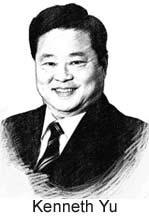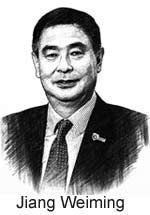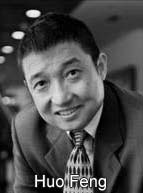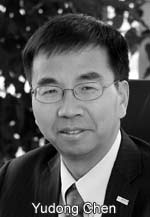|
 |
|
|
Editor's Note: As the 18th National Congress of the Communist Party of China, which opened on Nov 8, continues in Beijing, China Daily asked a number of top executives from international companies to give their impressions of the event and their expectations for the country. We asked five questions, and the answers we were given showed great confidence in China and its business environment under the country's new leadership, set to be elected at the congress.  |
|
|
And, while growth in China is slower than what we have historically seen, we believe it will still outpace the growth of developed economies. This does not change Greater China's position as an important part of Dow's strategy. However, the addition of new capacity to support growth will always be managed to deliver the product supply when needed, as is the case in all other global markets.
Dow continues to move ahead with growth initiatives in China, and we continue to carefully evaluate timing of these investments to match market needs. However, the broad direction remains unchanged. Domestic demand in China is closely linked to economic and social reforms, and we hope to see significant progress during the period of the 12th Five-Year Plan (2011-15).
We have seen a significant slowdown in demand in 2012. We do expect a mild improvement in 2013 but think this will be only gradual, and this assumes no further global economic "shocks" which we cannot rule out. The chemical industry reflects the broad economic base of the country, as we are a key supplier to many key industries - a number of which remain quite challenged. For the chemical industry to achieve its full potential, we need to see a broad-based economic recovery versus one more narrowly driven by government-sponsored infrastructure projects.
The commitment to greater innovation and nurturing value-added industries will benefit Dow and many other multinational businesses to do business in China. -----Peter Sykes president of The Dow Chemical Co Greater China |
|
|
I'm happy to see that some promising markets in China are growing rapidly with the support of an "invisible hand", such as healthcare, new energy, automobile and environmental protection. 3M has set foot in all these areas and has unbounded confidence in the Chinese economy. 
3M is a company driven by innovation. Our investment in innovation is the cornerstone for business in the future. We will consistently invest in research and development, with $120 million in the next five years. If you ask aCEOof any multinational company which is the most important country besides their home nation, it must be China. At 3M, we are here in China and for China. 
We are dedicated to capacity expansion in China, and our compound annual growth rate is expected to reach 15 percent to 20 percent in the next five years.

I'm confident China's economy will pick up in the first or second quarter next year, with the new leadership and recently announced government investment plans. We hope the new leadership can further encourage wholly owned foreign enterprises to invest in China, with favorable policies, and allow foreign direct investment in those State-owned sectors that were closed to us previously. ----- Kenneth Yu president of 3M China Region and CEO of 3M China |
|
|

In this year's global economy, to keep growing in the range of between 6 percent and 8 percent is healthy and already the highest rate in the world. For a life sciences and materials sciences company like DSM, China will continue to be the center of our strategy for many years to come. 
With growing needs for high-quality products and solutions on nutrition, health and new materials, China has become an even more important market for us and we will continue to expand our investment in the country to serve local needs.
Many companies might face bigger challenges this year in terms of business performance, which is a reflection of the external business environment, but we still have strong confidence in the next five years of business and in our ability to achieve profitable growth overall. The entire chemical industry in China is facing a great challenge of transforming from excessive capacity expansion to a green and sustainable development approach. We have to focus even more on achieving a balance between people, the planet and profit together, and that requires more cross-boundary cooperation between governments, local and multinational companies and non-governmental organizations.

To achieve sustainable development, Chinese companies are encouraged to report to their stakeholders not only their financial achievements but also their accomplishments in terms of environmental and social performance. -----Jiang Weiming president of Royal DSM China and corporate vice-president of DSM |
|
|
Within our own PayPal Chinese SME (small and medium-sized enterprise) Export Survey Report, we found that although up to 79 percent of export-related Chinese SMEs believe the global economy will slow down or stay the same, seven out of 10 export-focused Chinese SMEs still expect to grow their sales in the next three months. In fact, according to the report, e-commerce exports via PayPal's global payment platform from Greater China to overseas markets saw big double-digit growth, from 23 percent to 96 percent, from July 1, 2011 to June 30, 2012. By contrast, China's overseas shipments only increased by 7.8 percent in the first seven months of 2012, according to China's General Administration of Customs. PayPal believes cross-border e-commerce will be a successful formula for China's SME exporters, especially when its overall export growth has experienced a decline over the past quarters.
Being a global e-commerce and payment leader, PayPal is helping Chinese merchants, most of which are SMEs, sell to 117 million active PayPal users in 190 markets worldwide conveniently and safely and grow their online business around the globe. Since entering the China market in 2005, PayPal has grown in Shanghai, Beijing, Shenzhen, Chongqing, Guangzhou and Hangzhou and opened its first regional operations center, based in Shanghai. PayPal will remain committed to growing our business and expanding our investment in China.
Looking forward, we are dedicated to bringing more global online payment best practice to China and exploring new business opportunities here. In recent years, the growth of the global e-commerce market has made cross-border e-commerce a rising force in China's foreign trade sector, offering millions of enterprises with a brand-new business model to expand beyond the domestic market, compete globally and experience a leap in profitability. PayPal believes cross-border e-commerce will be a silver bullet for China's exporters. We are pleased to see the government has indicated its commitment to improving the overall business and investment environment. We always believe that a transparent and open market, where participants are judged by merit and capability, not other restrictive measurement, will greatly enable all participants to maximize their potential and ultimately contribute to China's sustainable economic growth.
----- Alan Tien General manager of PayPal China |
|
|
China's lowered GDP is the result of many issues -- fast growth over past decades; the expected economic model upgrade; impacts from recent global financial crisis; and the backlog time required to consume the 4 trillionRMBplan of 2009. It is now believed that China's economy has bottomed out and will gradually recover, starting in the fourth quarter. New efforts are under way by the government not only to promote more investments in strategic industries, but also to reform the country's marketing mechanism, including liberation of interest rates and release of more market-entry constraints to non-state owned entities. A stronger China GDP will fuel Agilent's growth. As the leading measurement company in the world, Agilent provides measurement equipment and solutions to a wide range of customers in diversified industries. Agilent has invested in China since the 1980s, and the country has remained a critical part of the company's strategy. With the ongoing development of the China market, China is now Agilent's second largest market. We are optimistic about China's long-term growth and maintain our commitment to develop business here. 
Agilent has consistently invested in China with our long-term strategy and confidence in the China economy. Though labor costs are increasing, there is still a big gap to find the best talent in the labor market –people who are well-educated, with good experience and an understanding of the China market. Agilent's goal here is to attract and retain these employees. Agilent continues to focus its efforts on R&D investment in coastal areas while investing in manufacturing in Chengdu,Sichuan province. We are expanding our sales presence to more cities and will move into the western areas to be closer to customers and capitalize on the opportunities. We believe there is no lack of opportunity in the country. 
Because China is committed to upgrading its industrial structure, pushing for quality economic growth, and eventually raising the standard of living, we believe that the Chinese Government will invest more in future years to boost those industries. This will create promising market and investment opportunities for multinational companies such as Agilent. Our conservative forecast for the growth of the high-tech cluster in China is at high double digits throughout next five to 10 years.
As our China business has grown, along with customer expectations, we are in need of the best talent. Highly qualified people, with working experience in a global organization, are not easy to source in the market. It takes years to develop them, and then retention becomes the next challenge. 
Market economyreform has led China to become "an economic miracle" in the world in the past 30 years. Going forward, balancing an open market with reasonable government control is key to continuing this economic growth. China has already become a major player in the world economy. We expect China can play an even more important role in the recovery of the world economy and in resolving worldwide issues. ----- Huo Feng President of Greater China, Agilent Technologies |
|
|
As an emerging market, in 2011 Bosch China contributes around 10 percent revenue to Bosch Group. Considering huge market potential, the government encouraging policies and favourable investment environment in China, Bosch has full confidence of China market to remain as Bosch's third biggest market globally and largest market in Asia by strengthening "local for local" strategy.
Some examples In 2012 could be shared: aligned with China's 'Go West' strategy, Bosch Chassis Systems Control, Power Tools and also Packaging Technology all open new plants in chengdu. In Qingdao, Bosch invest some 1.6 billion yuan for establishing Bosch's second manufacturing site of diesel technologies in China. And recently, Bosch opens a new plant and R&D center in Changsha with 700 million yuan investment.
This year in automotive industry, Passenger Car market enters into single-digit growth era and Commercial Vehicle market is experiencing a particularly sharp drop in demand. This affects our business division related to commercial vehicle market in particular.
As a diversified B2B company, Bosch China not only focus on business management talents, but also endeavours to cultivate high-skilled industrial workers to cope with increasing labour need from Bosch's business development in China. Based on Germany's "dual-system" mode of occupational education and its syllabus, Bosch China launched several "Apprentice Occupational Education" programs aiming to cultivating excellent "blue-collar" talents in cities like Beijing, Suzhou and Nanjing. Besides, Bosch also commits to support several vocational schools in poverty-stricken areas via BCCC's (Bosch China Charity Centre) effort in charitable ways.
Nowadays, governments and industries are making a combined effort to save energy and reduce emissions while driving steady growth. There are regulations and plans in emission reduction and environment come into effective in recent years, which shows government's determinations. For example, CN4 regulation is going to be releases in next July. However, beyond the regulation itself, we would highly appreciate strict implementation and monitoring according to these regulations and laws. We also hope the new leadership will consider the incentive program to the diesel passenger cars to help achieve the task of reducing the energy consumption. ----- Yudong Chen President of Bosch (China) Investment Ltd |
|
|
The Chinese economy will grow at a slower rate, but still at a rate exceeding 7 percent, making it the second largest economy. Healthcare reform in China has made considerable progress over the past three years, as health insurance now covers more than 95 percent of the population and reform is accelerating at county-level hospitals, and now the reform is entering the crucial stage. Urbanization is speeding up in China, people are making more money, the Chinese population is aging, chronic diseases are becoming more prevalent, and people are paying more attention to healthcare. It is for all of these reasons that BD China will play an increasingly prominent role in BD's global strategy and that China will remain one of the most important markets for BD in the next five years. 
For precisely these reasons, we believe that the healthcare market in China is still full of opportunities, in light of which BD Global will not postpone or cancel any investment in China in the short run. On the contrary, BD started building a new manufacturing site in the Suzhou Industrial Park in May of this year. With an accumulated investment of 200 million yuan and initial investment of 80 million yuan, it will be BD's third manufacturing site in China. We also plan to set up our R&D center in China in 2013 to develop products that will better meet local needs.  As mentioned earlier, BD China brought in substantial business revenue for BD Global in FY11, and contributed even more profit-wise. I have also touched upon production capacity. We expect China to contribute even more in the above three areas in the next five years. Compared to that in Europe and the US, the medical devices industry in China accounts for a small percentage of total healthcare spending and therefore has great growth potentials. Moreover, under the healthcare reform, we are seeing increasing investment in the infrastructure of healthcare institutions and other progress that I just referred to. So I believe that the medical devices industry should be able to maintain a growth rate of above 15 percent in the next five years. We are expanding our marketing team in China, building a nationwide distribution network, and investing in new plants and R&D centers.
 Compared to the pharmaceutical industry, the medical devices industry in China is lagging behind, in my opinion, in advanced and appropriate standards and product quality, and in enforcement when the standards are already in place. For example, in diagnostics, there are no good standards for the diagnosis of many diseases, and as a result, many diagnoses right now are differentiated by their costs, and end up being inaccurate, delayed and inconvenient and eventually affecting the patients' quality of life and adding to the country's healthcare costs. So I think the priority for the medical devices industry is to work with the government and academic community to improve standards in every relevant field and enhance the overall healthcare quality. ----- James Deng vice-president of BD and general manager of Greater China member of BD World Wide Operating Committee |





























